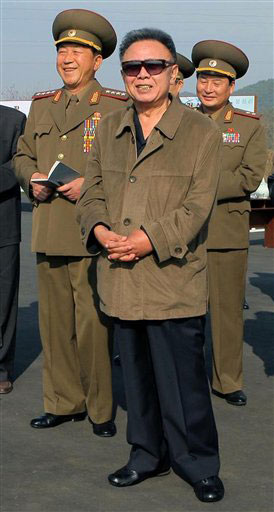Anyone who has seen images of the suffering in N. Korea brought on by a regime that puts self-preservation above the welfare of its people has ached to see that regime vanish off the face of the earth so its people and territory can be absorbed by the free and prosperous South.
Yet a world without N. Korea would cause a radical dislocation for many powerful interests in the world’s most powerful nations. This fact may have contributed to Kim Jong-il’s ability to remain firmly in power two decades longer than he might have otherwise.
Consider China. The motivation for Beijing’s bosses to shore up Kim Jong-il and cronies is based on much more than old friendships from having fought the Korean War on the same side. Without N. Korea China would become the sole remaining non-democratic nation in North and East Asia, facing off against some of the world’s most affluent societies and powerful militaries.
A key factor that has kept Beijing from becoming geopolitically isolated is its role as the regime with the most influence over an intransigent N. Korea. For two decades Beijing has played the role of the statesmanlike major power helping the U.S., Japan and S. Korea maintain dialogue with a trash-talking, nuke-armed N. Korea. That role has added immeasurably to China’s stature and influence in the international community. Without Kim & Gang, Beijing itself would find itself odd-man-out in regional and global disputes over issues like human rights, territorial disputes with neighbors Japan, Taiwan, the Philippines and Vietnam, currency reform, trade regulations, etc. But Beijing’s influence over Pyongyang has been a tacit bargaining chip used to defuse the pressures that would otherwise have been brought to bear. Little wonder that Beijing has been the Kim regime’s primary benefactor and trading partner.
Consider Japan. Its official stance has been a fervent desire to ensure its people’s safety by preventing N. Korea from deploying nukes. Accordingly, it has aggressively pursued the so-called 6-party talks and offered to contribute aid as an inducement to get Kim to give up reactors capable of producing weapons-grade fissile material. Yet without a rogue regime in place in N. Korea, Japan would suddenly find itself at a severe competitive disadvantage against a unified Korea. Not only would Korean competitors suddenly have at-home access to a low-wage labor force, they would be able to ship their goods over land via rail lines to China, Russia, the Middle East, Europe and Africa. Those factors would add another 5-10% to Korea’s cost advantage—an advantage that would only worsen the pain Japanese industry has suffered from Korean competition in everything from cars to ships to chips to cellphones to flat-panel displays.
Consider the U.S. Since the collapse of the Berlin Wall and the de facto conversion of China into a capitalist (if not democratic) nation, the U.S. has had an increasingly difficult time justifying its military bases in East Asia. Look at the current ruckus over the desire of Okinawans to rid themselves of a big noisy U.S. Marine base on the main island. Just last week another Japanese prime minister resigned rather than anger the U.S. by capitulating to the demands of Japanese citizens. Without a N. Korea run by a rogue totalitarian regime, the U.S. would have an ever harder time justifying the bases in Japan and Korea.
Why do the bases matter to the U.S.? Military planners will tell you that they provide a cost-effective deterrent to war in Asia as well as defensible and efficient forward bases if a shooting war begins. No doubt those are real factors against some remote but very unhappy contigencies. In the real world of here and now, they serve the U.S. in even more tangible fashion. Together with our bases in Korea, Germany, Turkey and elsewhere, they add immeasurably to U.S. power and prestige, putting glinting steel behind our peace-and-freedom-loving rhetoric. That rhetoric is real enough, in my view, but so is our desire to be the lone superpower with the strength and stability to sell trillions in treasures at very low interest rates to a global marketplace of insecure savers. And so is our desire to slowly but inevitably reshape the entire world into a playing field in which we have that certain je-ne-sais-quoi as the sole nation with the military muscle and presence to have its view taken seriously.
In other words, if Kim Jong-il didn’t exist, there’s ample incentive among the world’s powers to invent him or someone very much like him, located just about where he’s located, spouting just about the level of bellicose nonsense he’s spouting. Kim Jong-il is the one constant in a world that has been been changing around him. And many in the world have reason to be thankful as loathe as they might be to admit it.

